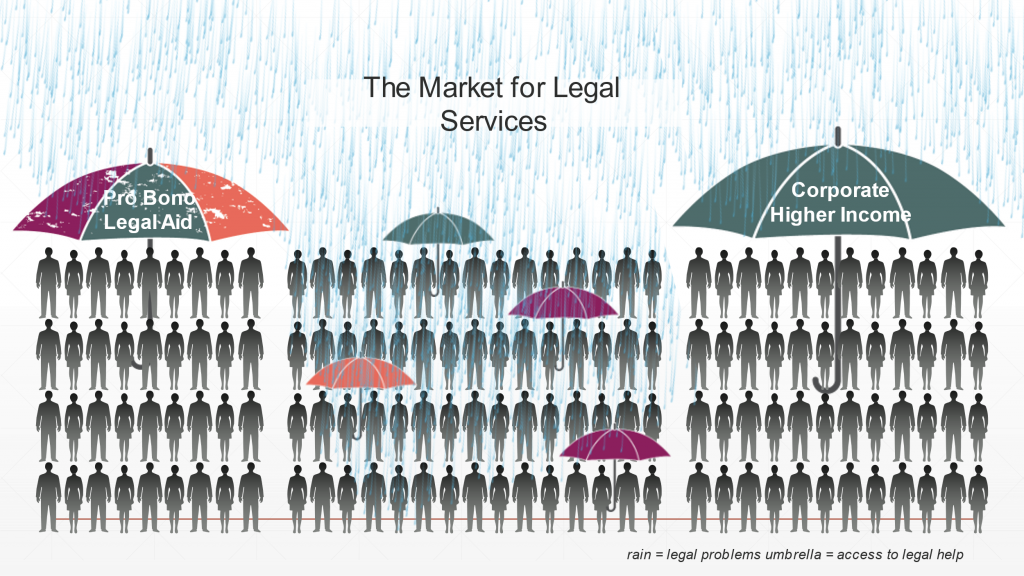Change is Coming: Is it Time to Let People Other Than Lawyers Deliver Legal Services in Idaho?

Kurt D. Holzer
Published February 2022
Even with organized and sustained efforts at expanding access to legal services, many Idahoans cannot get the legal help they need. As of 2019, half of Idaho’s 44 counties had 10 or fewer attorneys, three had none, and five had only lawyers employed by government.
Limited access to legal services is a problem that impacts people from most walks of life. A recent national study concluded that nearly 80% of civil litigants facing issues related to probate, divorce, child custody, landlord-tenant, debt collection, and the like have no representation in court proceedings. This lack of access comes with serious social, legal, economic, and political consequences. It is no surprise that the top 25% or so of people on the economic ladder, and corporate interests, can access legal assistance essentially without limit. The 35% near the bottom of that ladder have some ability to seek out assistance through a variety of pro bono, Legal Aid, public defender, or other resources. That leaves about 40% of the population in the middle who frequently cannot afford or otherwise obtain the legal assistance when faced with a legal issue.
Lack of access to legal services translates directly to a lack of access to justice. While there is no universally accepted definition of access to justice, my personal working definition provides:
“Access to justice exists when a person with a legal issue can, within their financial means, obtain that level of legal assistance needed to achieve a just outcome on the merits accompanied by the sense they were treated fairly in the process.”
We as a profession have some responsibility in having contributed to the problem of incomplete access by our role in developing the system’s well-intentioned regulatory structure. Regardless, our profession certainly has a leading role in addressing the problem.
Idaho is far from alone in seeing access issues impact its citizens. Across the country, pro bono and “low bono” efforts are nowhere near sufficient in and of themselves at providing access. Many states are thinking about how to serve populations that cannot currently obtain affordable help with legal issues. Regulatory barriers to delivering legal services are under scrutiny by academicians, regulators, and courts.
Legal regulatory reform may not sound sexy, but it is a hot topic.
The Idaho Supreme Court is starting to contemplate what more Idaho should do to provide Idahoans access to the legal assistance they need. This past summer, Chief Justice Richard Bevan, Bar Counsel Brad Andrews, Idaho State Bar Executive Director Diane Minnich, and I attended a program sponsored by the Conference of Chief Justices and the National Center for State Courts. The conference explored legal services delivery reform efforts underway across the country.
Almost all of us in practice have had an experienced paralegal or legal secretary with a depth of knowledge in an area or areas that no newly minted lawyer could ever match. Like many attorneys, lots of what I know about the practice of law was taught me by the paralegals I have been lucky to work with in my career. (Thanks Joanne, Katy, and others.) Cultivating and utilizing that important and valuable reservoir of knowledge and experience is starting to be recognized as one of the potential solutions to access issues in various states.
For example, in 2015, the Utah Supreme Court approved a licensed Legal Paraprofessional program. Utah LPPs can provide legal advice and assistance to clients in three areas of law with a traditionally high number of self-represented litigants: debt collection, eviction cases, and certain family law matters. While not authorized to represent clients in court, Utah LPPs can complete and file court documents, advise clients how a court order affects their rights and obligations, and represent clients in settlement negotiations.
Similarly, in 2020, Arizona approved a new category of licensee called legal paraprofessionals (LPs). In limited areas, including some family law, Arizona LPs can draft, sign, and file legal documents; provide advice, opinions, or recommendations; appear before a court; and negotiate on behalf of a client.
Utah LPPs and Arizona LPs are to the legal profession what nurse practitioners are in the medical world: people qualified by education, training, and experience to handle less-complex, more routine, work for less expense than more extensively trained and broadly qualified persons.
This past September, the California Paraprofessional Program Working Group submitted a final report recommending the widest scope of services of any state including court representation in some collateral criminal matters; consumer debt; employment and income maintenance; family, children, and custody; and housing. The recommendations remain under consideration by the California State Bar
This regulatory change is happening in far more than just these nearby states. Minnesota has an ongoing legal paraprofessional pilot project that allows participants to provide legal services in landlord–tenant disputes and family law cases. Other states including Illinois, Connecticut, Florida, Michigan, New Mexico, New York, North Carolina, Oregon, Virginia, and Washington are actively studying or have adopted regulations of the practice of law designed to enhance the access to legal assistance.
There are more revolutionary efforts at expanding and regulating the delivery of legal services as well. In 2020, Utah launched its Office of Legal Services Innovation to oversee what is referred to as Utah’s legal “regulatory sandbox.” That program allows entities to apply to use new models for legal businesses and offer new kinds of legal services. For example, it allows companies using technology platforms or service providers without law licenses to practice law while be very closely scrutinized by the regulators. The regulatory sandbox is the most aggressive current regulatory reform. It requires a huge commitment of State personnel, time, and resources. It remains in an experimental, evaluative, stage.
This is truly a moment, and legal regulatory reform an issue, where Justice Louis Brandeis’ vision of states as laboratories of democracy is in full flower.
The Idaho Supreme Court has the power and authority to make determinations related to the scope of licensure and the practice of law in our state. Any changes that come will be via processes the Court decides. The Idaho State Bar whose regulatory authority over licensed lawyers is delegated by the Court is one of many stakeholders with deep interest in any potential changes. For example, the scope of practice for any paraprofessional licensing Idaho considers will be intimately tied to availability and cost of relevant education and training. The Court has made clear it will consider input from all the appropriate stakeholders as it evaluates all aspects of these issues. Whether this happens via a task force or through some of the Court’s standing committees, we can all expect a thoughtful assessment of what, if any, changes to its practice of law regulations Idaho should adopt.
In the end, one of the enduring measures of the success of our democracy is whether we can make access to justice real. As the late Chief Justice Earl Warren said, “The success of any legal system is measured by its fidelity to the universal ideal of justice.”
Here’s to Idaho taking an intelligent, thoughtful new step in fulfilling the goal of achieving justice for all.
Special Note of Appreciation
There is another change on the near horizon for members of the Idaho State Bar (ISB). As you likely know, Bar Counsel Brad Andrews is retiring this year. Brad has served the ISB with distinction. He has made the Idaho Office of Bar Counsel the envy of many of his counterparts across the country. Brad has helped ISB Commissioners navigate many issues facing the Bar with careful analysis, insight, and aplomb. He has been a thoughtful sounding board for hundreds of practitioners facing ethical quandaries in their practice. His even-handed and reasonable approach to service, leadership, and management made our bar better. Thank you, Brad.

Kurt D. Holzer is currently serving as President of the Idaho State Bar. He is looking forward to gathering with lawyers from across Idaho to welcome you all in person to the first ever Idaho State Bar Convention held in Twin Falls this July.

